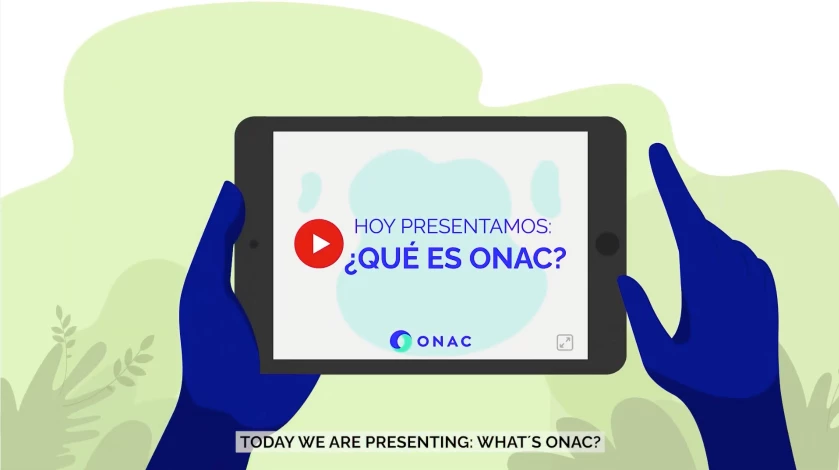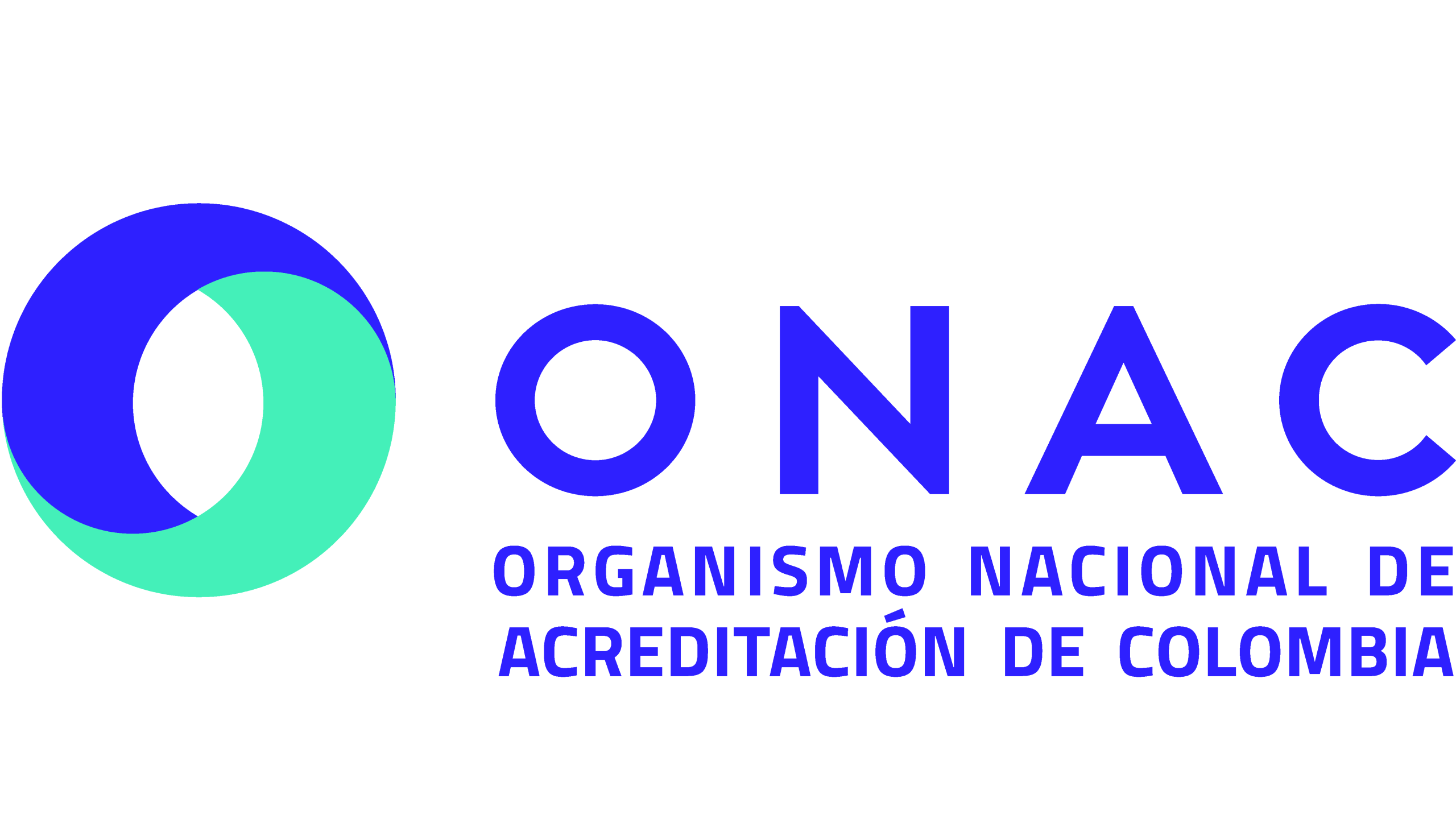











ONAC Presentation

ONAC
"ONAC has been the National Accreditation Body of Colombia since 2008. In that year, the nature of accreditation as a public administrative activity was eliminated and its technical nature was fully recognized."

FIND OUT MORE WITH SUPER ACREDITA – WHAT IS ONAC
The National Accreditation Agency is a corporation that belongs to the National Quality Subsystem – SICAL (Subsistema Nacional de la Calidad) –, is a privite, mixed and non-profit organization, which is constituted and organized under Colombian law, within the framework of the Colombian Civil Code, the rules on science and technology of Decree Law 393 of 1991 or the rules that modify, replace, or complement it, Article 96 of Law 489 of 1998 and the applicable international technical standards.
ONAC’s main purpose is to provide accreditation services to conformity assessment bodies in order to accredit their competence, to act as the monitoring authority for good laboratory practices of the Organization for Economic Cooperation and Development (OECD), and to perform the functions of the National Accreditation Body of Colombia.
The accreditation service opens opportunities for CABs and the producers they certify to demonstrate the quality of their products and services and even compete in international markets.
Given that ONAC’s work is evaluated by international peers, the certification of Colombian CABs is valid in multiple countries that are part of the international cooperation agreements to which ONAC is a party, agreements that are endorsed by peer evaluations, provided that accreditation bodies demonstrate compliance with the requirements of ISO/IEC 17011 “Conformity assessment. General requirements for accreditation bodies performing accreditation of conformity assessment bodies”.
In short, ONAC’s competencies constitute the provision of a public service of a commercial nature with a special legal regime that must be guaranteed by the State, regulated by international technical standards.
In consequence of the foregoing, this corporation must:
Intersectoral Commission on Quality.
ONAC has the rights inherent to the nature of the contractual relationship with the Conformity Assessment Bodies – CABs, set forth in the service contract for the granting and use of the accreditation certificate, those contemplated in the Accreditation Service Rules, in the Political Constitution and in the law.
Background
Article 3 of Law 155 of 1959 provides that the National Government is responsible for «(…) intervening in the establishment of standards on weights and measures, quality, packaging and classification of products, raw materials and articles or merchandise with a view to defending the interests of consumers and producers of raw materials (…)». For its part, Colombia approved the accession to the World Trade Organization Agreement through Law 170 of 1994, which contains, among others, the Agreement on Technical Barriers to Trade, which encourages countries to actively recognize the results of conformity assessments of other countries, such as testing, examination, inspection, calibration, verification and certification, when these are issued by bodies accredited by accreditation bodies recognized by multilateral accreditation cooperations.
In turn, through Law 8 of 1973, Colombia approved the Andean Subregional Agreement. Subsequently, in November 2019, the Commission of the Comunidad Andina approved Decision 850, which creates the Andean Quality System and recognizes that, «technical standardization, technical regulation, accreditation, conformity assessment and metrology are essential tools for the development of the Andean Subregion, since they promote the progressive improvement of the quality of products traded in international trade, and to achieve the legitimate objectives of national security; the prevention of practices that may mislead, the protection of human health or safety, life, animal or plant health, or the environment, among others».
Article 4 of Decision 376 of the Comunidad Andina, related to the Andean System of Standardization, Accreditation, Testing, Certification, Technical Regulations and Metrology, establishes that «The activities of standardization, accreditation, testing, certification, technical regulations and metrology included in the System shall be applicable to all products and services manufactured or marketed in the Subregion, without considering phytosanitary and zoosanitary aspects, or other aspects that are already regulated by a particular Decision. These activities shall be coordinated with the Competent National Organizations designated by Law in each Member Country.»
Particularly, Article 18 of Decision 850 of the Comunidad Andina establishes that, «The National Accreditation Bodies of the Member Countries will be in charge of evaluating and accrediting the technical competence of the conformity assessment bodies operating in the Andean Subregion; for which they must comply with the requirements of the current version of the international standard ISO/IEC 17011».
As a consequence of the regulatory development of the National Quality Subsystem (Subsistema Nacional de la Calidad – SICAL), Decree 1595 of 2015 and 191 of 2022, compiled in the Single Regulatory Decree of the Commerce, Industry and Tourism Sector, Decree 1074 of 2015, coordinates the activities carried out by public and private instances related to the formulation, implementation and monitoring of policies on technical standardization, development and issuance of technical regulations, accreditation, designation, conformity assessment and metrology.
In this context: (i) The exclusive exercise of the accreditation activity set forth in Article 2.2.1.1.7.7.6 of Decree 1074 of 2015 is aimed at representing and carrying the country’s position before the Comunidad Andina de Naciones and multilateral forums on accreditation matters, and participating in regional and international institutions and activities related to accreditation activities, without prejudice to the competencies that public entities and cross-border Accreditation policies have in this area. (II) The accreditation activity is a service of public and social interest provided by ONAC, subject to national private law and international standards of accreditation, particularly the international standard ISO/IEC 17011 or that applicable in accordance with Andean decisions, with scope in technical regulations and standards. The accreditation service shall be provided by means of the procedures issued by the corporation for such purpose and based on the costs required for the rendering of such service.
ONAC Creation
Within the framework of the policies adopted in CONPES 3446, the National Accreditation Organization of Colombia – ONAC – was created through an act of incorporation registered at the Bogota Chamber of Commerce in November 2007, event attended by the founding members of the corporation, interested in promoting the accreditation service.
In December 2008, Decree 4738 designated ONAC as the National Accreditation Body, as the country’s option to obtain international recognition of accreditation, and indicated the functions that it must fulfill in that capacity.
As a national accreditation body, ONAC has the following responsibilities:
- To provide services under non-discriminatory conditions and to comply with other provisions on economic competition.
- Establish an internal procedure to declare impediments and abstain from acting when there is a conflict of interest.
- Process applications for accreditation in accordance with international technical standards.
- Permanently guarantee the suitability of the personnel involved in its activities.
- To accredit, after verification of compliance with the requirements, the conformity assessment agencies to operate in the National Quality Subsystem.
- Maintain a monitoring and surveillance program to demonstrate at any time that accredited bodies continue to comply with the conditions and requirements on which their accreditation was based.
- To provide the Ministry of Commerce, Industry and Tourism with the information requested on the exercise of the accreditation activity, without detriment to compliance with the principle of confidentiality.
- Ensure its international recognition through membership, participation, evaluation and other programmed actions in regional and international institutions and forums related to accreditation activities.
- To be the official source of information on accreditation in Colombia.
As an ESAL, the authority that oversees ONAC is the Mayor’s Office of Bogota.
Note: the means by which ONAC obtains financial support are set forth in the statutes.
